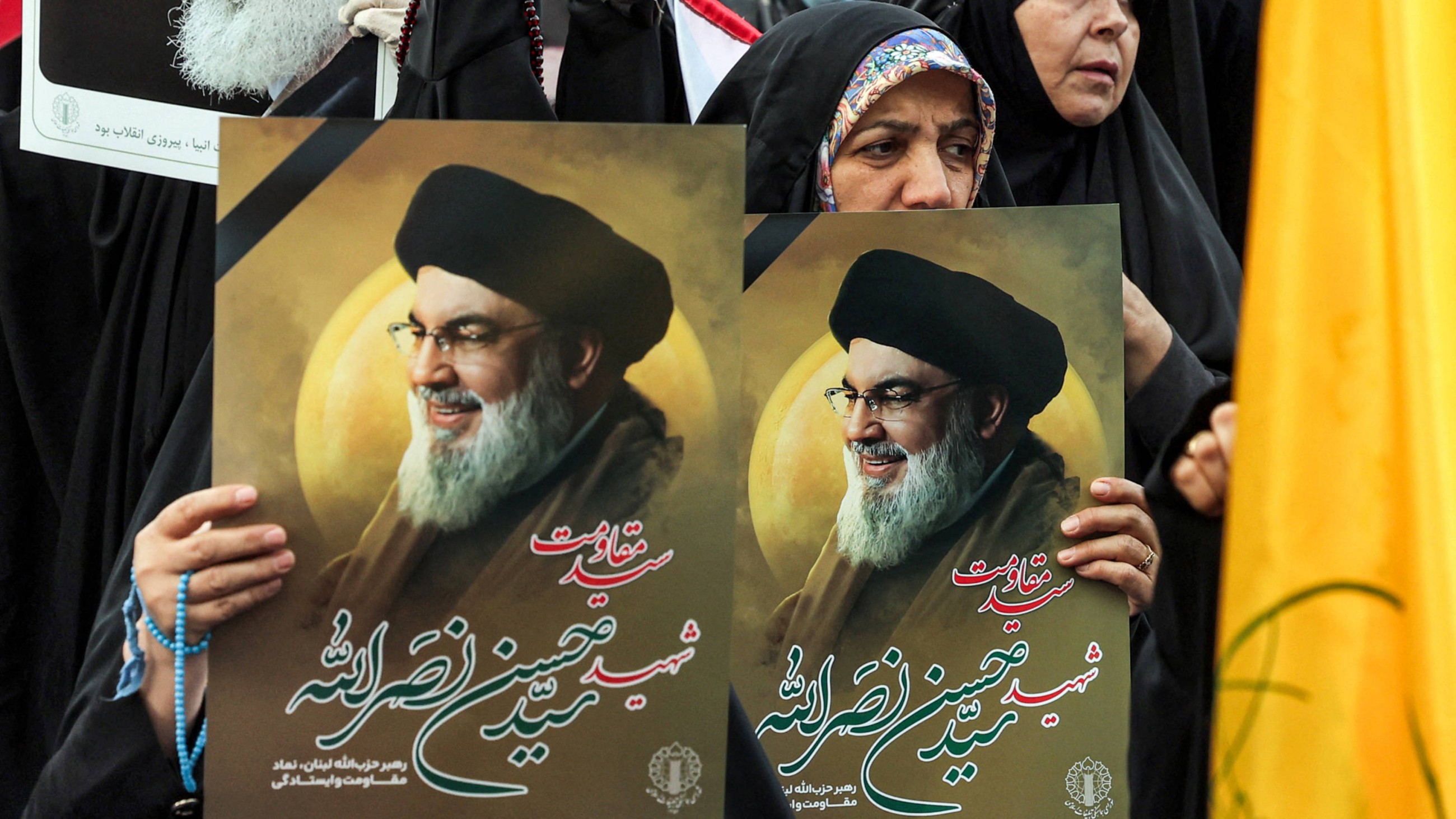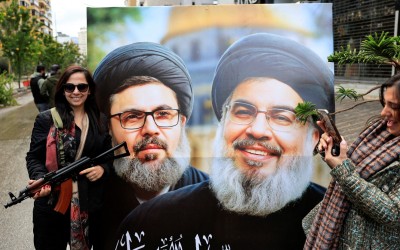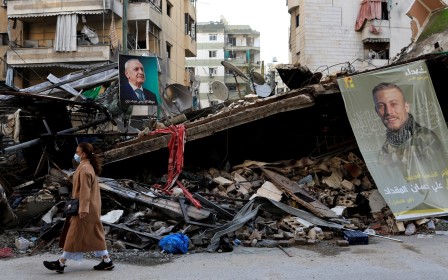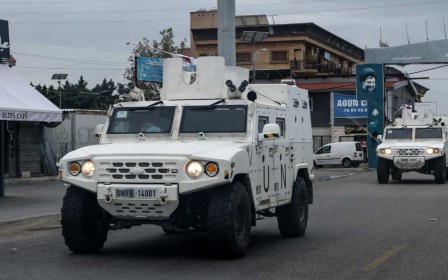Why Iranian conservatives are against the Israel-Hezbollah ceasefire

With Israeli Prime Minister Netanyahu framing the ceasefire with Hezbollah as a strategic move to pivot towards Iran’s nuclear threat, some in Tehran are bracing for an increased military threat to the country.
Several conservative Iranian voices have raised concerns that easing tensions on Israel’s northern front could embolden Iran's arch-enemy in the region. Officially, however, Iran has hailed the cessation of hostilities between Israel and Lebanon as a victory for the Lebanese group.
"When the Israeli regime declares Iran as the primary target of the ceasefire in Lebanon, it means we will inevitably face them, whether we want to or not," a conservative analyst close to the Iranian establishment told Middle East Eye.
The analyst said that as Israel shifts its focus away from the northern front, it will have greater capacity to regroup, concentrate on neutralising the Gaza front and potentially push the US towards a more aggressive stance on Iran's nuclear facilities.
"The question is which side will act first and with greater force to engage the enemy," the analyst said.
New MEE newsletter: Jerusalem Dispatch
Sign up to get the latest insights and analysis on Israel-Palestine, alongside Turkey Unpacked and other MEE newsletters
"Israel has always worried that Iran, through its allies - especially in Lebanon and Gaza - might target the country. Now, with the ceasefire in the north, the decoupling of the Lebanon and Gaza fronts, and reduced operations in Iraq, Israel might make a miscalculation - one that must be prevented."
Decoupling of fronts
Since the start of the war on Gaza, Hezbollah and its regional allies rallied behind Hamas under the "unity of fronts" strategy, which saw Israel getting attacked from Lebanon, Yemen, Iraq and Iran.
However, as the conflict escalated into a devastating full-scale war in Lebanon, it became increasingly difficult for Hezbollah to maintain the link between the Lebanese front and a ceasefire in Gaza. More than 3,900 people in Lebanon were killed in Israeli bombardments, and over a million were displaced.
The Israel-Hezbollah ceasefire agreement has effectively decoupled the two fronts, raising concerns in Iran about the implications for the "Axis of Resistance".
'Now, with the ceasefire in the north, the decoupling of the Lebanon and Gaza fronts, Israel might make a miscalculation - one that must be prevented'
- Political analyst
"In effect, this agreement grants Israel a degree of relief on the Lebanese front, enabling it to aggressively pursue its objectives in other areas with heightened focus and determination," a second conservative foreign policy expert told MEE.
"This should be a cause for concern, as it signals the likelihood of escalating tensions across the region with even greater intensity."
While Netanyahu touted the ceasefire as a defeat for Hezbollah and an opportunity to shift focus towards Iran, the Lebanese group and Tehran were quick to portray it as a victory for the resistance.
In a conversation with the Lebanese foreign minister, Iran's top diplomat, Abbas Araghchi, described the agreement as an achievement won through the resilience of the Lebanese people, the determination of Hezbollah fighters and the political manoeuvring of the Lebanese government.
The commander of the Islamic Revolutionary Guard Corps (IRGC), Hossein Salami, wrote a letter to Hezbollah's leadership, saying: "The ceasefire on the Lebanese front is a strategic and disgraceful defeat for the Zionist regime, which failed to achieve any of its objectives or malicious ambitions in its war against Hezbollah. This may even mark the beginning of a ceasefire and the end of the war in Gaza."
However, the official narrative has done little to assuage fears of escalating regional tensions.
A former senior diplomat told MEE: "As long as Gaza remains in conflict, the Middle East crises cannot be considered resolved. Yemen, Syria, Lebanon and Gaza are still part of the region's challenges."
In the media
Many in the Iranian media have echoed the official interpretation of the ceasefire, albeit with some reservations.
Conservative outlet Kayhan, whose chief editor is appointed by Supreme Leader Ali Khamenei, argued that Israel's "failure" stemmed from its inability to advance in southern Lebanon, Hezbollah's uninterrupted cross-border rocket fire, and the group's capacity to reorganise and maintain its combat structure following the killing of its senior commanders.
The reformist Etemaad Daily wrote that the ceasefire reinforces Hezbollah's standing in Lebanon and preserves its readiness for potential future conflicts with Israel.
"It portrays Hezbollah as a responsible force while strengthening its legitimacy domestically and regionally. Additionally, the ceasefire offers the Axis of Resistance an opportunity to reassess and rebuild its capabilities for future engagements."
However, the paper added that the end of fighting on the Lebanese front reduces pressure on Israel, allowing it to focus its operations on Gaza. It further warned that the ceasefire could invite international pressure to limit Hezbollah's political and military roles.
Celebrating victory
Ahmad Ghadiri, a conservative analyst, described the ceasefire agreement as a "chalice of poison".
In a post on X, he warned that the ceasefire could lead to an increased Israeli military presence in the south and the potential disarmament of Hezbollah.
'When the people of Lebanon are happy and celebrating victory with Hezbollah flags, who are we to analyse defeat or a lack of success?'
- Sadegh Nikoo, journalist
He also criticised the delay in Iran’s promised response to Israeli attacks on its soil, calling this a key factor in the current situation.
Other observers, however, saw the ceasefire as a victory for Hezbollah. Diako Hosseini, a reformist foreign policy analyst, argued that one indicator that Hezbollah was not defeated lies within the nature of the agreement itself.
"Hezbollah has not been defeated by Israel for the simple reason that if it had been, we would have witnessed a peace agreement, not a ceasefire agreement, which implicitly recognises Hezbollah’s military and offensive capabilities."
Quoting former US Secretary of State Henry Kissinger, Mohsen Milani, an independent analyst and US-based professor of international relations, wrote: "The conventional army loses if it does not win. The guerrilla wins if he does not lose."
For conservative journalist Sadegh Nikoo, the true measure of the ceasefire lies in the sentiments of the Lebanese people.
"When the people of Lebanon are happy and celebrating victory with Hezbollah flags, who are we to analyse defeat or a lack of success?"
Middle East Eye delivers independent and unrivalled coverage and analysis of the Middle East, North Africa and beyond. To learn more about republishing this content and the associated fees, please fill out this form. More about MEE can be found here.





